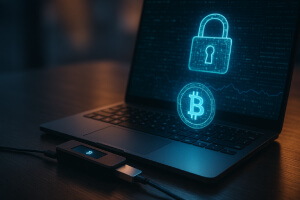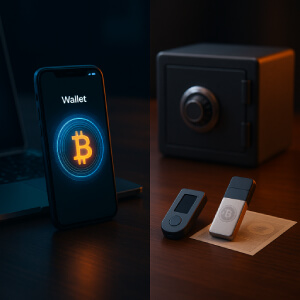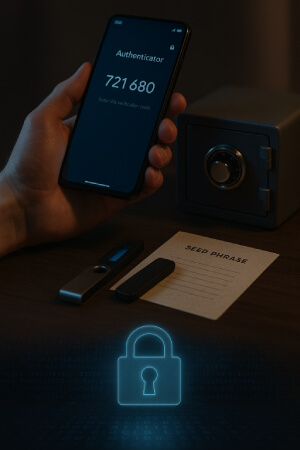Importance of wallet security

A cryptocurrency wallet can be thought of as a digital wallet for the coins rather than a physical one. It is the batten for your assets. The coins are recorded on the blockchain and the entire transaction history is kept in a public ledger which everybody can view but no one can change. A private key - a long cryptographic code that identifies you as the rightful owner - is what grants you admission. If you misplace it, the coins are still existent but that they are eternally unreachable.
This is an unexpected outcome for the very beginners. With banks, the password can be changed. With cryptocurrency, there is no "Forgot my key" option. The very idea of eliminating intermediaries was to make the system more convenient for customers, but it also meant that no one could step in to assist you in case of errors. Security remains a personal issue. It is liberating and daunting at the same time.
Digital and physical wallets

This is normally the point of discussion when wallet safety comes up and the distinction is drawn. The contrast is quite simple and very clear: internet connection.
Hot wallets are those that are online. These include your phone apps, MetaMask, a browser extension, and your trading account on an exchange where you can buy or sell right away. They are easy to use, fast, and free to make. They are entirely fit for everyday use. However, the disadvantage is that any online activity can be attacked in some way. Phishing schemes, malware or even one unsecured password can very easily result in an emptied account.
In contrast, cold wallets are not ever connected to the internet. They can be hardware like Ledger or Trezor, or even paper documentation stored in a safe. Hackers will never reach them since they are not online. You only connect them when you need to do a transaction. They are certainly slower than hot wallets, but that very slowness is part of the security.
Most people consider the mixture of the two wallets as the most feasible solution: a small hot wallet for quick and easy transfers or NFTs, and a cold wallet for long-term keeping. The first type is operated by traders while the latter is chosen by investors.
Setting up your first wallet
Let's assume you've chosen to start right from the beginning. You either download a wallet app or a hardware device. During processing, the app will tell you a term called a seed phrase—a collection of 12 or 24 random words. Those words are your all in all. They recreate your wallet on any device. If someone gets hold of them, they will be able to recreate your wallet as well.
This is where the majority of newbies commit their first error. They take a screenshot of the phrase or save it in the notes app of their phones. It might feel harmless but it's just like jotting down your bank PIN on a stick note and placing it on your fridge. Screenshots might be included in cloud backups and phones can get hacked.
The correct move is the old one: write the phrase on a piece of paper and keep it in a safe place. If you can, even better, engrave it on a metal plate that can withstand fire and water. Some people divide the phrase into two parts and keep the parts in different places, for example, one at home and one with a trusted relative.
Don't ever disclose your seed phrase over the internet. There will never be a genuine support agent who will ask for it. That's the first rule.
Understanding private keys
If the seed phrase is the master key, the private key is the master key for each wallet address. With most modern wallets, you hardly ever see it — it's behind the interface—but it's the one that signs each transaction. The owner of the private key rules over the money.
In contrast to passwords, private keys cannot be modified. Once they're revealed, they're compromised perpetually. Therefore, having offline backups becomes so important. It's not about being overly cautious, it's just a matter of basic self-protection.
If you ever manually export or import private keys, always check every step thoroughly. If possible, use a secure, offline computer. Do not copy and paste them into online forms or send them to yourself through email. It may sound like common sense but it happens that someone does it in a hurry.
Phishing and social engineering
Most crypto theft doesn't happen through genius-level hacking. It happens through manipulation. Someone pretending to be “support” sends you a message saying your wallet is at risk. They share a link that looks legitimate — same logo, same colors, one letter off in the URL. You click, sign in, and it's over.
Phishing scams feed on panic. They use urgency - “Your funds will be frozen in 30 minutes!” - to make you skip the usual checks. Always slow down. Verify the sender. Open official apps directly instead of clicking links.
And remember: no wallet provider or exchange will ever ask for your seed phrase or private key. They don't need it. If someone insists, it's a scam, no matter how official it sounds.
Device and network hygiene
Your wallet's security depends on your device. A strong wallet can't save you if your computer is full of malware. Keep software updated, run antivirus scans, and never download wallet apps from random sites. Go straight to the official domain or app store.
Public Wi-Fi is another trap. Logging into your wallet at a café might seem harmless, but public networks are playgrounds for data sniffers. If you must use one, connect through a reputable VPN.
Also, avoid mixing work and wallet devices. If possible, use a separate phone or laptop for your crypto activity. It creates a barrier that keeps accidental clicks, downloads, or phishing attempts from leaking into your wallet environment.
Two-factor authentication and backups

If your wallet or exchange account supports two-factor authentication, enable it immediately. Use an authenticator app like Authy or Google Authenticator instead of SMS. SIM-swap attacks are real — hackers convince a mobile carrier to move your number to a new SIM and intercept codes.
Backups are equally critical. Store copies of your seed phrase or hardware device recovery data in multiple secure locations. Fireproof safes work well. Some people use safety deposit boxes. The point is redundancy—if one copy burns or floods, another should exist.
Custodial vs non-custodial wallets
Another distinction you'll hear often: custodial versus non-custodial. In a custodial wallet, an exchange or service holds your keys. It feels safe and convenient. If you forget your password, they help you recover access. The trade-off is trust. You're counting on them not to fail, get hacked, or freeze withdrawals.
Non-custodial wallets put the responsibility entirely on you. You own the keys, the phrase, the risks, and the freedom. Most long-term crypto users prefer this route once they understand it. As the saying goes, “Not your keys, not your coins.”
That phrase may sound dramatic, but history proves it right. When exchanges collapse - as they sometimes do - users of custodial wallets often lose access overnight. Self-custody avoids that. It's harder at first, but it grows natural with time.
Common beginner mistakes
Even the most careful individuals commit minor mistakes which lead to big problems eventually. The following are some mistakes worth avoiding:
- Using the same password for multiple accounts.
- Putting seed phrases in email drafts or taking pictures on the phone.
- Not marking backups or not trying recovery.
- Transferring assets to an incorrect blockchain network.
- Buying hardware wallets from unauthorized sellers on eBay instead of the official site.
All these might appear insignificant until they happen to you. Good habits become strong early. Set up a schedule - check devices every month, go over where backups are placed, and make sure URLs are correct before connecting your wallet.
Advanced protection: multi-signature and hardware layers
When you go beyond the basics, stronger tools meant for serious investors or companies will be waiting for you. One of them is multi-signature often referred to as “multi-sig.” It functions like a safe that needs more than one key to be opened. Instead of controlling your wallet with a single private key, you can ask for two or three distinct signatures to approve a transaction. So this way, even if one device or one copy is compromised, the money remains secure.
Some users divide these keys among devices or even between trusted friends or family members. It does slow down the process, yes, but such delay is intentional. It creates friction exactly where it is most needed — before the money moves.
Hardware wallets are still at the center of personal security. When you authorize a transaction, you physically push a button on the device. The private key, however, never leaves the hardware even if your computer is infected. That physical segregation is one of the simplest yet most powerful defenses in the world of crypto.
More of a mindset than a checklist
In the end, the security of the wallet is not a one-time action but a practice. It is the cognizance that every short cut, every “I will do that later”, lets someone in. The means are easy: strong passwords, cold storage, offline backups, doubts about any link that looks urgent.
You don't need a degree in cybersecurity to do this. What is needed is consistency and a bit of self-awareness. The blockchain does not forget, but if you form good habits now, you will not have to suffer the lesson being hard.
For cryptocurrency, however, protection does not mean being paranoid. It means having a clear conscience instead.
Dive deeper
The ways in which blockchain can be structured reveal a technology that extends far beyond cryptocurrency, offering frameworks that sustain ecosystems, enable collaboration, and create value through services, platforms, and innovative business interactions.
— Antonio Grasso (@antgrasso) October 24, 2025
Microblog @antgrasso pic.twitter.com/3oKHceB9fj
DeFi’s next unlock isn’t about new tokens or incentives, it’s about privacy as infrastructure.
— Amit (@GAmitej) October 5, 2025
Confidential lending built on Fully Homomorphic Encryption (FHE) turns credit, collateral, and identity into encrypted variables.
It lets protocols verify risk without revealing data.… pic.twitter.com/EfO7PrriFG